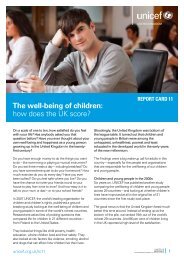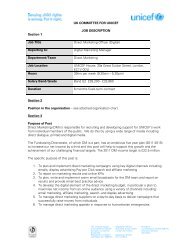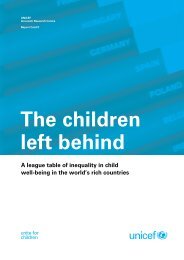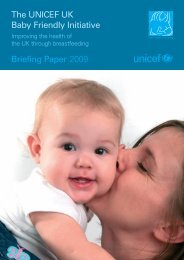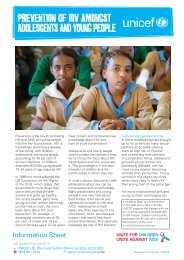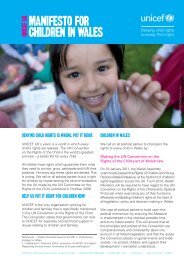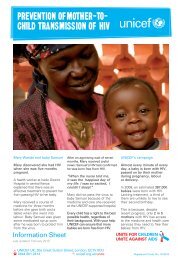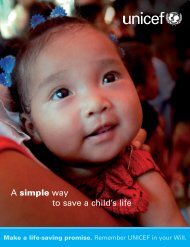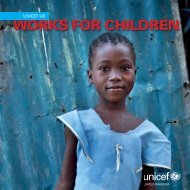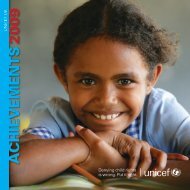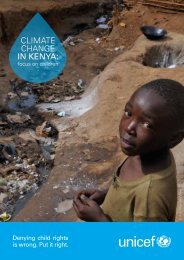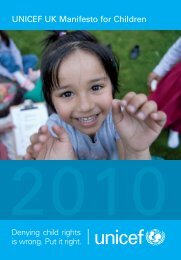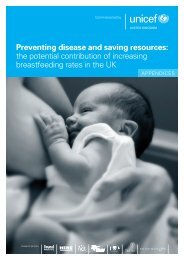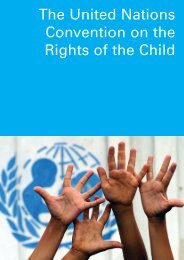UNICEF UK Trustees Report and Financial Statements 2010
UNICEF UK Trustees Report and Financial Statements 2010
UNICEF UK Trustees Report and Financial Statements 2010
Create successful ePaper yourself
Turn your PDF publications into a flip-book with our unique Google optimized e-Paper software.
The United Kingdom Committee for <strong>UNICEF</strong><br />
<strong>Report</strong> of the <strong>Trustees</strong><br />
For the year ended 31 December <strong>2010</strong><br />
Girls’ education, Beyond Sport<br />
<strong>UNICEF</strong> <strong>UK</strong> is the international development partner of Beyond Sport, an<br />
organisation dedicated to furthering the global sport for development movement. In<br />
<strong>2010</strong>, Beyond Sport held their second annual summit during which <strong>UNICEF</strong> <strong>UK</strong> ran a<br />
one-day seminar on the role of sport in girls’ education. Leading professionals from<br />
the worlds of sport, education <strong>and</strong> girls’ empowerment shared the successes <strong>and</strong><br />
challenges of using sport to encourage girls to go to <strong>and</strong> stay in school. As a result of<br />
this meeting, the UN Girls Education Initiative (UNGEI) are now conducting a<br />
research project designed to uncover good practice <strong>and</strong> make recommendations to<br />
global organisations <strong>and</strong> national governments on the role sport can play in<br />
supporting girls’ education.<br />
Climate change<br />
Climate change presents the world with an urgent global challenge, making it harder<br />
to meet the Millennium Development Goals <strong>and</strong> undermining <strong>UNICEF</strong>’s priorities in<br />
making the world better for children. Climate change is seriously affecting children<br />
due to a wide range of impacts including rising malnutrition, diminishing water<br />
supplies, increasing disease <strong>and</strong> more frequent <strong>and</strong> severe storms <strong>and</strong> floods.<br />
In <strong>2010</strong>, <strong>UNICEF</strong> <strong>UK</strong> launched Carbon Positive to raise funds to help children adapt<br />
to their changing climate. Carbon Positive, an alternative to carbon offsetting,<br />
enables individuals <strong>and</strong> companies to put right the damage caused by carbon<br />
emissions by funding <strong>UNICEF</strong> adaptation programmes <strong>and</strong> encouraging them to<br />
reduce their carbon footprint. <strong>UNICEF</strong> <strong>UK</strong> developed a carbon calculator to help<br />
individuals <strong>and</strong> organisations work out their carbon footprint <strong>and</strong> we provided an<br />
opportunity to invest in <strong>UNICEF</strong>’s climate change adaptation work in five areas:<br />
water, food, disaster preparedness, health, <strong>and</strong> education.<br />
Solar lamps, Mauritania<br />
Much of Mauritania lacks electricity or suffers from sporadic electricity supply. Many<br />
schools either have to shorten their days so that children can travel safely to <strong>and</strong><br />
from home during daylight hours, or provide kerosene lamps that are hazardous,<br />
expensive to fuel, <strong>and</strong> provide flickering light. Solar lamps are a low-cost alternative<br />
that emit constant bright light. The lamps improve the quality of learning as children<br />
can study better at school <strong>and</strong> in their homes at night. The lamps also help to extend<br />
the school day <strong>and</strong> enable children <strong>and</strong> others to take evening classes. Initial<br />
evidence from 125 rural schools using solar lamps provided by <strong>UNICEF</strong> <strong>UK</strong> showed<br />
considerable improvements in pupil registration <strong>and</strong> attendance. In <strong>2010</strong>, Energizer<br />
donated £120,000 to help <strong>UNICEF</strong> <strong>UK</strong> provide solar power to a further 260 schools,<br />
extending <strong>and</strong> improving education in Mauritania.<br />
Rainwater harvesting, Mozambique<br />
In <strong>2010</strong>, <strong>UNICEF</strong> <strong>UK</strong> provided £33,000 for rainwater harvesting programmes at<br />
schools in the Chibuto, Changara <strong>and</strong> Buzi districts of Mozambique. Seven out of 10<br />
schools in these three rural areas lack water <strong>and</strong> sanitation facilities. These districts<br />
also suffer the effects of climate change, experiencing prolonged droughts <strong>and</strong><br />
shorter rainy seasons that result in limited groundwater. Poor access to safe water<br />
19



